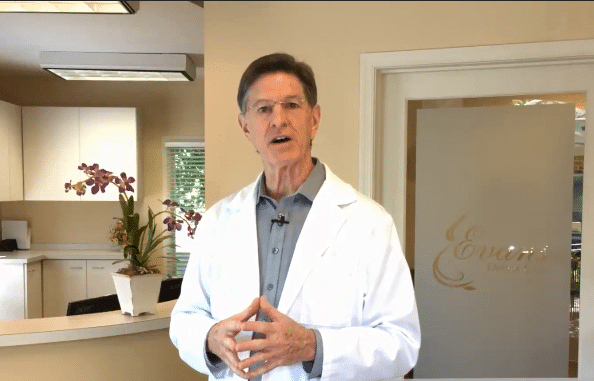Checkout Dr. Peter S. Evans, MS, DDS, MAGD Watch Video
Dr. Peter Evans graduated from high school right here in Williamsburg, VA before meeting the challenge of preparing for a career as a dentist. He earned a Bachelor of Science degree at East Carolina University, then conducted cancer research for the National Institute of Health. Dr. Evans completed graduate school at Medical College of Virginia, receiving a Master of Science Degree in Microbiology and Immunology. His career path continued at that institution, where he earned the title of Doctor of Dental Surgery. In addition to excelling as a student, Dr. Evans served as adjunct faculty at Virginia Commonwealth University.
Dr. Evans has achieved the elite designation as Master in the Academy of General Dentistry. Committed to knowledge sharing for the advancement of dentistry, Dr. Evans coaches other dental professionals. He teaches practice management and efficiency at a local and national level. Additionally, he lectures professionally on the topic of BioCompatible dental care. He is a founding member of the American Academy for Oral Systemic Health (AAOSH), and President of The BioCompatible Difference, LLC.
Dental Implants
Can Dental Implants Improve My Health?
Your teeth are important. I don’t need to tell you this. But just how important? Well, when mammals lose their teeth, do you know what happens? They will die! Humans are the only mammals that can fabricate little pink and white plastic bits that can substitute for teeth.
Wearing dentures can reduce life expectancy by 10 years. This is because it’s difficult to have a heart healthy diet. Implant supported dentures are turning this around. Implant supported dentures are strong and allow you to eat most anything you like.
Bio-Ceramic Dental Implants
Implants are a versatile option for tooth replacement.
- Stand-alone – In a precisely planned procedure, an implant is placed into jawbone at the site of a missing tooth. Over time, bone fuses with the implant, creating a secure foundation for a dental crown, that helps to avoid deterioration of bone.
- As part of a bridge – Implants can support a bridge when there are no natural teeth. This option is great for missing back teeth.
- To support a denture – As few as four dental implants dramatically improve the stability of a denture. The denture is made with special attachment points that snap over implants. As an added benefit, an implant-retained upper denture does not cover the palate. It is lighter and more comfortable, allowing natural temperature and taste sensation.
Dental crowns
Dental crowns are an effective way to protect a broken tooth or safeguard a tooth from potential disaster. Crowns allow you to chew on a tooth without the fear of it breaking in half down to the nerve.
Big fillings are the culprits. Fillings that are only 20% of the tooth are very safe. You still have 80% of the tooth left to chew on and more than enough tooth left to protect the filling. Big fillings that are 55 or 65% of the tooth only leave 35% of your natural tooth left to chew on and protect the big filling. Big fillings are weak and they break. Many times, there’s just not enough tooth left to put a new filling in. That’s the time the tooth needs a crown.
Periodontal Disease
Periodontal (gum) disease is insidious. It is an infection of the gums that starts out as plaque, an opaque film on the teeth that hardens to form tartar. As tartar accumulates, it harbors bacteria that attack the soft tissue around the gums. This is the early stage of gum disease known as Gingivitis. Left untreated, Gingivitis becomes Periodontitis which ultimately destroys the tissue surrounding your teeth AND the bone that holds your teeth in place. Except for bad breath and gums that bleed, there are very few early warning signals. The disease advances silently, often without pain, and before you know it, you are losing your teeth and you don’t know why.
Tooth loss is only the most obvious indicator of gum disease. Scientific research has discovered linkage between gum disease and stroke, heart disease, diabetes – even an increased risk for pregnant women. When your gums become diseased, your entire immune system is weakened.
Sealants
To place a sealant an adhesive is first applied to the teeth. The sealant is then placed over the adhesive as a liquid, as if it is painted right onto the tooth. The liquid then hardens and creates a barrier between your tooth and any plaque, food particles, and bacteria. Sealants last for about 10 years and can be reapplied if necessary.
Wisdom Teeth
Impacted wisdom teeth can cause structural damage to the jaw and other teeth. They can also provide a place for bacteria to gather since they are hard to reach and clean. These potential problems make it necessary to remove impacted wisdom teeth so that larger problems do not arise. Routine x-rays during a dental exam can reveal if you will need to have your wisdom teeth removed.
Why Should a Dentist Look At a Patient’s Health, Not Just Their Teeth?
A BioCompatible dentist approaches oral care with a focus on its connection to overall health. After all, your mouth is part of your body! This type of dentist uses BioCompatible restorative materials that are not toxic to human physiology, and techniques that “first do no harm.” The holistic dentist strives to help patients prevent the causes of disease, or eliminate them to restore wellness, rather than simply addressing symptoms. Holistic dental care promotes the body’s natural capabilities for regeneration and healing.
What Is BioCompatible Dental Care?
You might think of BioCompatible as “body friendly.” BioCompatible dental care utilizes the least invasive and traumatic methods of diagnosis and treatment, coupled with materials that do not disrupt the mouth or bodily systems. This includes non-metal and non-toxic options for fillings, crowns, bridges, dental implants, and orthodontics.
Why Is Amalgam a Concern?
Amalgam has been used in this country for filling cavities since the 1830s. It is an alloy of silver, tin, and copper bound with liquid mercury, one of the most toxic metals on earth. Mercury can be absorbed through mucous membranes of the mouth and ingested in saliva. In addition, hot liquids and the heat from chewing releases mercury vapor.
Should I Have My Amalgam Fillings Removed?
That is a very personal decision. Some individuals choose to have dark fillings removed for cosmetic improvement; others for the potential health benefits. If you wish to have your amalgam fillings replaced with BioCompatible restorations that blend beautifully with your smile, it is important to use a safe removal technique.
Do I Need a Conventional Dentist In Addition To Dr. Evans?
No. Holistic/BioCompatible dental care encompasses preventive, restorative, and cosmetic treatments – done simply with a “whole-body health” approach. Dr. Evans offers additional services you probably won’t find at a conventional dental practice. Bear in mind that, while Evans Dental Care provides comprehensive care, there are situations where referral to a specialist is in the patient’s best interest.
What Are My Payment Options?
Dr. Evans believes that everyone deserves a healthy mouth and body. Our Business Administrator works closely with patients to maximize insurance benefits. We accept payment for the patient’s responsibility by cash, personal check, debit card, or major credit card. In addition, we assist with application for flexible financing with low- or no-interest through CareCredit.
Can I Call The Office And Get My Questions Answered?
You may have questions that need answering. We can help. If you don’t see the answer to a question you have, simply call Donna and if she doesn’t have the answer, she knows who to go to get it. Call Donna at (757) 220-1999 and let’s get your questions answered.




